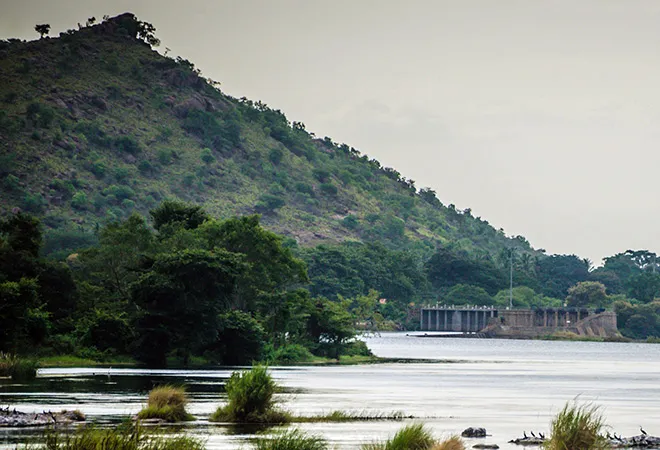
It has been over a month since the approval of a Supreme Court mandated Cauvery Management Authority, but we are back answering the same question – when, who and how will the plights surrounding the Cauvery delta be taken care of?
With the completion of the State elections in Karnataka and the politically dramatic events that followed — a hung assembly and the resignation of the elected BJP Chief Minister within three days of swearing in — there has still been no concurrent decision on the Cauvery water dispute. To top it off, Karnataka waited nearly a month to appoint State representatives to the authority and is advocating another Supreme Court litigation as the State government continues to think the Centre-ratified scheme is unilateral.
It is well known that since the dispute started off nearly a century ago, the two riparian states have been contending on self-interest over a finite resource. Despite several efforts to resolve this dispute, State governments have not seen eye to eye. Thus, the verdict by the Supreme Court given on 16 February 2018 stated the allocation of water and asked the Centre to form an authority to look after these matters. However, political parties in these regions created a brouhaha; mainly created to avoid hurting their vote banks in the poll bound State of Karnataka.
Easy enough, dilatory actions by the Centre delayed the formation of a scheme till the end of the State elections, nearly three months later, making good an escape from contempt.
The BJP and the Congress, two of the major national parties, failed to mention their plan of action on resolving the Cauvery dispute in their manifestos. Nevertheless, both parties proposed development and prosperity to farmers, turning a blind eye to their counterparts in Tamil Nadu. Easy enough, dilatory actions by the Centre delayed the formation of a scheme till the end of the State elections, nearly three months later, making good an escape from contempt.
The scheme highlights the functions of the Cauvery Management Authority that not only encompasses the allotment, regulation and utilisation of waters but also emphasises the authority’s decisions as final and binding. Though it is reported that this statute might be harmful because the Centre can take a despotic position, it has the added benefit of ensuring resolution in the case of non-cooperation. It has also been stated that the authority will be assisted by a Cauvery Regulation Committee whose main responsibility would be to determine the storage in reservoirs and to adopt a formula to redistribute water during poor rainfalls. The need for innovative technologies and methods to store and use water in times of deficiencies has also been recognised. The association of technical experts and administrative officials can also prove beneficial in bringing in a dynamic resolution that might be agreeable to all States.
But with a Supreme Court approved scheme in place, can the people of both riparian states feel certain about the benefits of such an authority? An answer to this question demands the influence of politics to be decoupled from this dispute.
However, this is still an illusion for most in the Cauvery delta. After the results of the Karnataka elections, the majority party, the BJP was invited to form the government. This meant an alignment of interests among the State and Centre regarding matters of the Cauvery water. This would have enabled a healthy dialogue between the State and Centre. But with the resignation of the BJP candidate, the Congress formed an alliance with a regional party, JD(S). With a joint majority, this alliance has appointed Kumaraswamy as the Chief Minister. This victory has been applauded by many ministers of Tamil Nadu, who want a Modi free reign in the South and believe that with Kumaraswamy at power, they can have peaceful dialogues about water allocation and Karnataka will be willing to share water. Though, Kumaraswamy has suggested otherwise, expressing his apathy towards Tamil Nadu’s need for more water by arguing that Karnataka lacks enough water for itself.
The need for innovative technologies and methods to store and use water in times of deficiencies has also been recognised. The association of technical experts and administrative officials can also prove beneficial in bringing in a dynamic resolution that might be agreeable to all States.
JD(S) had clearly mentioned that they would rectify the injustice meted out by the Congress and the Supreme Court verdict that propounded the formation of a board that would harm Karnataka’s interests and will instead continue to build irrigation facilities, utilising the extra water that the Supreme Court ordered for drinking purposes of Bengaluru. This seems to be an issue. Because presently with a scheme in place and its order to release 31.24 tmcft water to Tamil Nadu, Kumaraswamy is at a loss of standing by his mandate as it would be against the orders given by the Supreme Court. Moreover, with the Centre still under BJP, and their opposition at the State, the Centre might not be forgiving in doling out penalties. In addition, Tamil Nadu leaders can be fearful of more agony in the Cauvery delta. It would mean that Tamil Nadu leaders might have to beg for water to stay in power in their State and thus once again aggravate the conflict. In Tamil Nadu, this would also weaken the power of Stalin by other upcoming political celebrity candidates. This might create regional and national conflict of interests, a phenomenon that has occurred frequently in the past.
This leaves us to question the efficiencies of legislative orders in the light of partisan politics and the inefficiencies of policy making such as the failure to submit an ex-ante formula in the case of a rainfall deficiency. For this reason, the conflict around the Cauvery seems to be incessant and unsolvable.
The views expressed above belong to the author(s). ORF research and analyses now available on Telegram! Click here to access our curated content — blogs, longforms and interviews.



 It has been over a month since the approval of a Supreme Court mandated Cauvery Management Authority, but we are back answering the same question – when, who and how will the plights surrounding the Cauvery delta be taken care of?
With the completion of the State elections in Karnataka and the politically dramatic events that followed — a hung assembly and the resignation of the elected BJP Chief Minister within three days of swearing in — there has still been no concurrent decision on the Cauvery water dispute. To top it off, Karnataka waited nearly a month to appoint State representatives to the authority and is advocating another Supreme Court litigation as the State government continues to think the Centre-ratified scheme is unilateral.
It is well known that since the dispute started off nearly a century ago, the two riparian states have been contending on self-interest over a finite resource. Despite several efforts to resolve this dispute, State governments have not seen eye to eye. Thus, the verdict by the Supreme Court given on 16 February 2018 stated the allocation of water and asked the Centre to form an authority to look after these matters. However, political parties in these regions created a brouhaha; mainly created to avoid hurting their vote banks in the poll bound State of Karnataka.
It has been over a month since the approval of a Supreme Court mandated Cauvery Management Authority, but we are back answering the same question – when, who and how will the plights surrounding the Cauvery delta be taken care of?
With the completion of the State elections in Karnataka and the politically dramatic events that followed — a hung assembly and the resignation of the elected BJP Chief Minister within three days of swearing in — there has still been no concurrent decision on the Cauvery water dispute. To top it off, Karnataka waited nearly a month to appoint State representatives to the authority and is advocating another Supreme Court litigation as the State government continues to think the Centre-ratified scheme is unilateral.
It is well known that since the dispute started off nearly a century ago, the two riparian states have been contending on self-interest over a finite resource. Despite several efforts to resolve this dispute, State governments have not seen eye to eye. Thus, the verdict by the Supreme Court given on 16 February 2018 stated the allocation of water and asked the Centre to form an authority to look after these matters. However, political parties in these regions created a brouhaha; mainly created to avoid hurting their vote banks in the poll bound State of Karnataka.
 PREV
PREV


